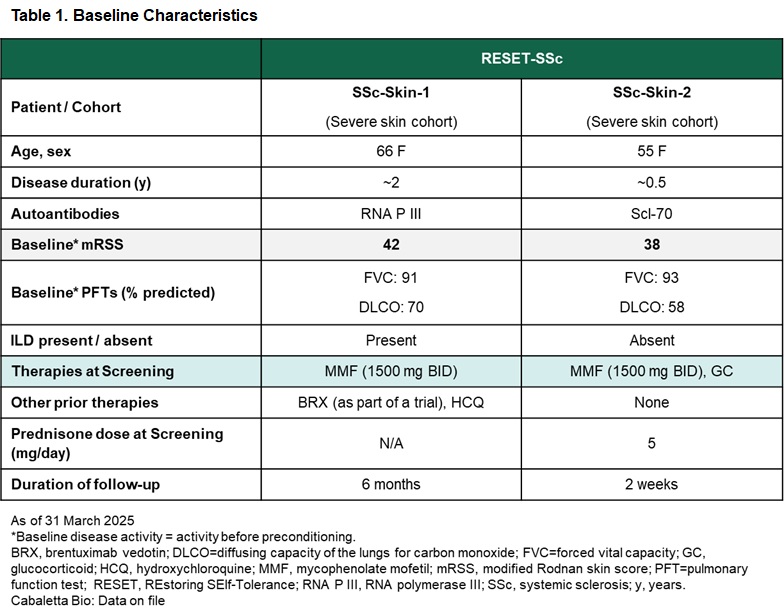Session Information
Date: Monday, October 27, 2025
Title: (1553–1591) Systemic Sclerosis & Related Disorders – Clinical Poster II
Session Type: Poster Session B
Session Time: 10:30AM-12:30PM
Background/Purpose: The treatment goals for systemic sclerosis (SSc) are to control disease activity, limit progression of organ damage and decrease long-term morbidity and mortality. Therapies providing durable clinical responses without requiring chronic administration are lacking. Rese-cel (formerly CABA-201) is a fully human, autologous 4-1BB CD19-CAR T cell therapy designed to deeply and transiently deplete CD19 positive cells following a weight-based, single infusion to enable an “immune system reset” with the potential for durable response without chronic immunomodulatory (IM) therapy. RESET-SScTM (NCT06328777) is an ongoing Phase 1/2 trial evaluating rese-cel in 2 independent cohorts of adults with SSc and either severe skin or organ involvement.
Methods: Eligible patients were 18 to 75 years with SSc. A weight-based infusion of 1×106 CAR T cells/kg was administered following preconditioning with fludarabine and cyclophosphamide. All non-glucocorticoid (GC) IM agents were stopped by Day -5. Adverse events, modified Rodnan skin score (mRSS), pulmonary function test (PFTs), nailfold capillaroscopy (NFC) and use of IM medications were evaluated. CAR T cells and B cells were profiled in peripheral blood pre- and post-infusion by digital PCR and flow cytometry, respectively. Serum cytokines were measured using the mesoscale discovery platform. Inguinal lymph node biopsies were taken from SSc-Skin-1 before and 21-days after rese-cel under a biorepository at University of Michigan; tissue was labeled for B cells (CD19, CD20, and PAX5, not shown) and T cells (CD3).
Results: As of 31 March 2025, 2 patients were infused with rese-cel (Table 1); SSc-Skin-2 did not have sufficient follow-up for efficacy or translational assessments. A third patient was recently infused.SSc-Skin-1 had grade 2 cytokine release syndrome (CRS) but no dose-limiting toxicity (DLT) or immune effector cell-associated neurotoxicity syndrome (ICANS). SSc-Skin-2 experienced grade 3 ICANS based on a transient period of isolated confusion without seizures, motor findings, or signs of cerebral edema, which resolved in < 2 days with GC alone.SSc-Skin-1 showed improvement on mRSS, PFT and NFC at 6 months off all IM therapy. MRSS gradually improved from 42 to 34. NFC showed preliminary evidence of improvement of capillary density and size.SSc-Skin-1 exhibited robust expansion of rese-cel that peaked at Day 15 post-infusion and was undetectable by Day 29. Serum IFNγ levels increased post-infusion and peaked prior to rese-cel peak expansion. Peripheral B cells were rapidly reduced in circulation by Day 15 and in lymphoid tissue (Figure 1) at Day 21. B cells reconstituted by 8 weeks post-infusion with a transitional naïve phenotype (CD19+CD20+CD38++CD24++) and switched to predominantly mature naïve by 6 months.
Conclusion: Data from the first SSc patient infused with rese-cel shows early IM-free clinical response and acceptable safety profile in the setting of CAR T cell expansion and complete peripheral and lymph node B cell depletion. These initial data suggest the potential for rese-cel to reset the immune system in SSc, allowing patients to achieve meaningful clinical responses off all IM therapies.
To cite this abstract in AMA style:
Khanna D, Ghosh M, Shah A, Bracken S, georges g, Richardson C, Tsou P, Ross C, Zahn C, Little C, diCasoli C, Raymond M, GuhaRay A, Volkov J, Nunez D, Furmanak T, Stadanlick J, Ishikawa L, Vorndran Z, Ellis A, Williams J, Flanagan S, Lam Q, Braccia D, Hadi-Nezhad F, Tummala R, Basu S, Chang D. RESET-SSc: Clinical Trial Evaluating Rese-cel (Resecabtagene Autoleucel), A Fully Human, Autologous 4-1BB CD19-CAR T Cell Therapy in Systemic Sclerosis [abstract]. Arthritis Rheumatol. 2025; 77 (suppl 9). https://acrabstracts.org/abstract/reset-ssc-clinical-trial-evaluating-rese-cel-resecabtagene-autoleucel-a-fully-human-autologous-4-1bb-cd19-car-t-cell-therapy-in-systemic-sclerosis/. Accessed .« Back to ACR Convergence 2025
ACR Meeting Abstracts - https://acrabstracts.org/abstract/reset-ssc-clinical-trial-evaluating-rese-cel-resecabtagene-autoleucel-a-fully-human-autologous-4-1bb-cd19-car-t-cell-therapy-in-systemic-sclerosis/


.jpg)